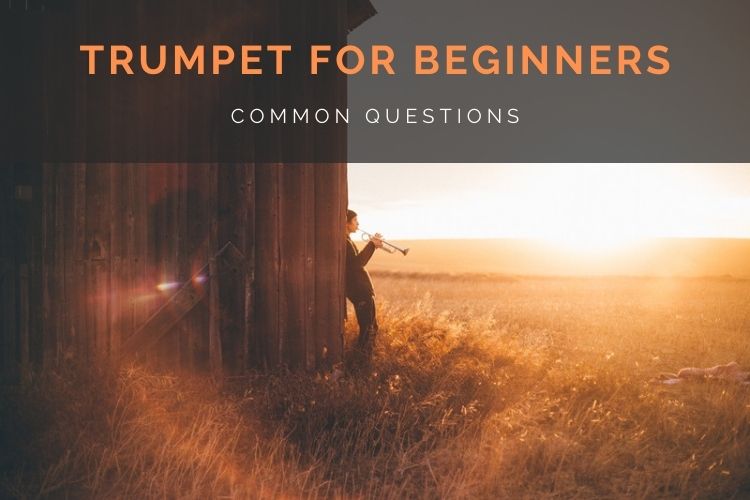When beginners first start learning trumpet, they commonly ask some of the questions we list below.
Those are all valid questions that any student would ask.
In this guide, we will answer those and also provide some tips on the easiest trumpets to start learning and playing. Learning trumpet for beginners should be easier after reading this article.
Can I Teach Myself the Trumpet?
The short answer is yes, but it will take a lot of time and effort on your part.
Considering the number of resources these days around the web, from Youtube videos to websites like ours, where you have plenty of tips to start with, it’s easier to learn trumpet nowadays compared to some years or decades ago.
Despite that, the best way to learn how to play an instrument is still from an experienced player used to teach instruments to beginners, whether it’s at your school or from a private teacher.
Personalized lessons and recommendations based on what you need as an individual learner will offer you the right guidance for you to start and keep motivated along the way.
Moreover, many people find that they can keep up with their studies better when they have someone there guiding them through the process of learning such an instrument as the trumpet.
Is Trumpet Hard to Learn?
Despite not being considered as one of the harder band instruments to study, learning the trumpet can be difficult, and many people have a challenging time adjusting to how it feels in their hands and to some techniques.
However, this is true of any instrument that you are learning for the first time.
Once you get used to it and start playing more often, you continuously adjust to the feel of holding and using an instrument like the trumpet.
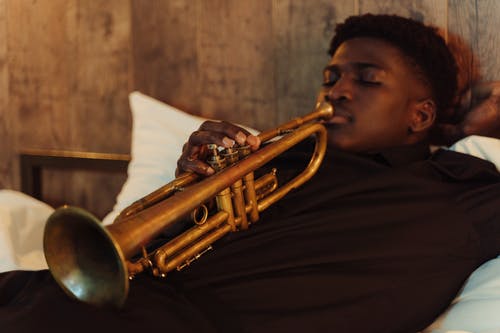
How Many Hours a Day Should I Play the Trumpet?
If you are starting, at least half an hour per day would be ideal. If you can add more time, then perfect. Your goal should be to do this at least 4 days a week or more.
Ideally, you would do, for example, at least two sessions of 30 mins each day, resting around 10 mins between each if doing them consecutively. This helps the brain and your “muscle” memory to register that session and give you a deserved rest after focusing hard for the first session.
Such goals are general ones, and depend on your level, commitment, and time availability of course, but can serve as a metric especially for beginners to keep the learning process enjoyable and incremental.
Performing with an instrument like the trumpet at least on an amateur level will never happen if you do not have the desire and patience to practice it for some hours every week. Also, to keep getting better, make sure that those hours are as well-spent as possible by doing focused practicing on one skill at a time or completing a series of exercises that concentrate on one aspect of trumpet playing.
How Long Does It Take to Learn the Trumpet?
If you are aiming at an amateur level that will allow you to play some fun songs and to play on a school band, then in some months to a year you could do it, assuming that you can play for at least 3 hours a week (for example, sessions of 30 minutes during 6 days).
The more you practice, the more you will be able to advance and the less time you will need to get at least the basics of performing the trumpet.
However, we can consider that there is no set amount of time that someone needs to become proficient on such an instrument as the trumpet because we are all different and a beginner starting might have different goals and time available to train and play the instrument.
Also, a beginner player without any previous experience in musical instruments might need more months than someone already used to playing other band instruments.
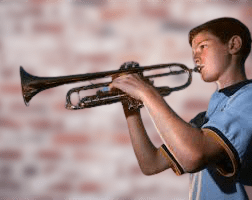
As mentioned previously it is possible for a person who has never played before and has only read about trumpets on their own, to teach themselves how to play the trumpet with practice and persistence, especially in these days where you have plenty of courses online or youtube videos that can guide you on learning the instrument. Due to recent times and more specifically when everyone was at home doing quarantine, online learning has become the new normal and schools have completely changed their music lessons to online.
However, we recommend as much as we can that you learn from someone with experience teaching younger students or beginner players, whether it’s your teacher at school, a private music teacher, or through online courses run by experienced musicians.
The Easiest Beginner Trumpet Models to Play
Easier to play should mean that you get the best quality-price options available in the market. Because a low-quality instrument might be the most difficult one to play.
There are plenty of student and beginner models to choose from, but there are only a few that might help you progress in learning the instrument and make your task easier in terms of producing decent sounds.
On the opposite side, some of them are inadequately constructed and might present soldering issues as well as valves that stop working after just a couple of weeks or months. You should avoid new trumpet models below the $100 to $150 price range, as that will mean you will normally get a low-quality instrument.
Picking a good student trumpet can be a little bit challenging because there are numerous brand-new trumpet brand names out on the marketplace today.
We’ve selected the ones that are wider accepted as easier trumpets to play while keeping good quality for your beginner to student level. We present them from different cost ranges so that you have various choices to choose from, depending on your budget.
If you are opting to buy a pre-owned trumpet instead of a new one, check our buying guide for used trumpets.
Jean Paul TR-330
The Jean Paul TR-330, a B-flat trumpet, is a fantastic horn for being under 200 dollars. It is normally a second choice to the same brand’s other student model the TR-430 which is pricier.
It is well worth its price and also you can not find a far better trumpet, for under 200 dollars than the Jean Paul TR-330.
So if cash is limited, begin with this Tr-330 and recognize that it is always possible to update a few years down the line.

Jupiter JTR700 Series
If you are trying to find a great student trumpet and you desire a brand with a great reputation, that’s been around for a very long time, then the Jupiter 700 collection could be a good choice.
The Jupiter 700 series is an excellent trumpet to buy for a learner, assuming you have the cash for it. It could be even considered as an intermediate-level trumpet, so you get a model that might last you more in your beginning journey of learning it.
This is a premium quality horn and is also among the most effective trumpet brand names for trainees/starters as well as if you are determined to go with Jupiter after that you are ensured to not run into any type of unpleasant shocks with valves that stop working. It is extremely easy to play and its sound is pleasing.
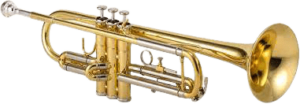
Yamaha YTR 2330
A traditional among the entry-level trumpets is the Yamaha YTR 2330. With a more expensive price tag, between $500 to $900 for a used model, or around $1,400 for a brand new instrument, it is characterized by its simple playability with unified articulation, as well as its design with the most affordable possible weight and ergonomics, just ideal for beginners.
There is no support on the main tuning train, which makes it easier to manage. In regards to the price tag, it is listed below $500 (depending on where you get it from) in a reasonable range with a proper price-performance ratio.
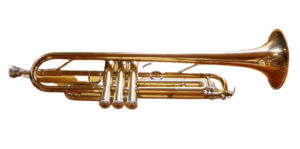
Prices of the Most Used Trumpet Student Models
There are also other popular trumpet models for beginners and intermediate players.
We’ve listed below the most widely used ones and their average prices.
| Trumpet Model | Estimated Price | Woodwind & Brasswind | Amazon |
|---|---|---|---|
| Yamaha YTR-2330 | $1,400 | See Price | See Price |
| Bach TR200 | $2,250 | See Price | N.A. |
| Bach TR300 | $3,150 | N.A. | See Price |
| Jupiter JTR700 | $1,300 | See Price | See Price |
| Conn 52BSP | $1,800 | See Price | N.A. |
| Allora ATR-250 | $500 | See Price | N.A. |
| Eastman ETR221 | $1,200 | See Price | N.A. |
| Etude ETR-100 | $265.00 | See Price | N.A. |
| Jean Paul USA TR-330 | $230 | N.A. | See Price |
The Importance of Practice While Learning the Trumpet
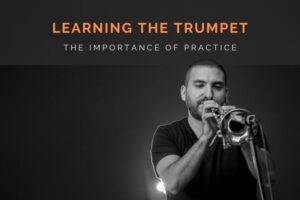
The importance of practice when learning an instrument can be treated as an assumption from the start, but difficult to do it daily, especially for young trumpet players.
It is a returning question from parents about why and how to practice regularly, so we like to give a helping hand in understanding why practicing regularly is a must for young trumpet players.
The Need for Creating Habits
“We are creatures of habit.”
This well-known sentence is often cited in different sectors and under various circumstances, being also applicable to musical practice as well. First of all, we have to set our minds to accept the need for regular practice while learning and improving a new instrument.
When we understand why and how to practice regularly, it is easier to have a correct mindset so that it becomes a natural daily habit.
There is a need to create precise and deliberate habits to be musical, and relaxed, and to avoid tension and injuries. It is much easier to set new habits than to change old ones, and wrong ways of practice, so it is fundamental to be conscious of that need from the beginning.
Training Physical Aspects for Playing Trumpet
It is important to draw attention to, that the trumpet player’s body functionates as a part of the instrument.
However the string of a guitar or a reed of a saxophone is picked/blown by the player to generate sound, they physically belong to the instrument.
Contrary to the trumpet, where the sound itself is generated by making the lips vibrate with our blown airstream.
Another aspect of the physical need for practice is that playing the trumpet is unnatural to our body, the purpose of our lips is not to vibrate into a mouthpiece. It follows therefore that our muscles (lips, lungs, diaphragm) first have to be developed, then maintained regularly.
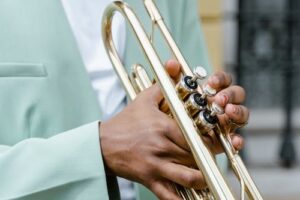
Focusing on Mental Aspects of Playing the Trumpet
Playing music generally requires high attention and focus.
We have to read the music sheet, which contains several pieces of information such as tone and rhythm. This information has to be combined and transformed into our instrument, which consists of multiple elements such as which valve to press, how high/low to play, and with what kind of intensity. We also have to synchronize our lips, tongue, and fingers.
This set of multiple coordinated activities requires a high mental capacity and concentration, which also need to be developed and trained along your journey of learning trumpet.
A Musical Approach Mindset
“Never practice, but always perform!” This quote from the legendary Adolf Herseth (former principal player of the Chicago Symphony Orchestra) refers to the importance of being musical by every single note.
We are musicians primarily and the trumpet is only an asset to express our musical feelings and thoughts.
With this mindset, we cannot divide trumpet playing into practicing and performing, we have to express ourselves musically by playing the trumpet and forming every note accordingly. It is also the desired way to get a flow effect (Csikszentmihalyi, 1990) while playing, which helps us to reach success and therefore to enjoy practicing.
We hope these fundamentals will help young players and their parents to get familiar with regular, daily practice and make it an enjoyable routine.
Practicing regularly is a must, especially for young players while learning such an instrument as the trumpet.
FAQs About Learning the Trumpet
Can I teach myself trumpet?
Yes, but with a lot of time and effort. The best way to learn it is through an experienced trumpet player used to teach beginners, whether in your school or from a private teacher.
Is the trumpet easy to learn?
It is not one of the hardest instruments to start with, but many beginners have difficulties adjusting to how it feels in their hands and to some techniques.
How long does it take to learn the trumpet?
It should take you months to a year to achieve a level where you can play some fun songs by yourself, assuming that you practice at least 3 hours a week.

